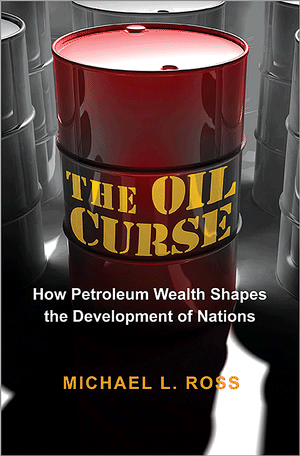You can also view these publications on Google Scholar or view my CV here.
Books
The Oil Curse: How Petroleum Wealth Shapes the Development of Nations
Princeton University Press, 2012
Also published in Russian (русский), Portuguese (português), Japanese (日本語), and Arabic (العربية)
Timber Booms and Institutional Breakdown in Southeast Asia [Amazon]
Cambridge University Press, 2001
Articles
Where has democracy helped the poor? Democratic transitions and early-life mortality at the country level
with Antonio Pedro Ramos and Martiniano Jose Flores
Social Science and Medicine, 2020
What Drives Successful Economic Diversification in Resource-Rich Countries?
with Addisu A. Lashitew and Eric Werker
World Bank Research Observer, 2020
What do we know about export diversification in oil-producing countries?
Extractive Industries and Society, 2019
Kleptocracy and Tax Evasion Under Resource Abundance
with Hamid Mohtadi, Uchechukwu Jarrett, and Stefan Ruediger
Economics and Politics, 2019
Global progress and backsliding on gasoline taxes and subsidies
with Chad Hazlett and Paasha Mahdavi
Nature Energy, 2017
Oil and International Cooperation
with Erik Voeten
International Studies Quarterly, 60:1 2016
What Have We Learned About the Resource Curse?
Annual Review of Political Science, 2015
The Big Oil Change: a closer look at the Haber-Menaldo analysis
with Jørgen Juel Andersen. Online appendix
Comparative Political Studies, 47:7 2014
The Political Economy of Petroleum Wealth: some policy alternatives [external link]
Middle East Development Journal, 5:2 2013
What's So Special About the Arabian Peninsula?
Quarterly Journal of Political Science, 7:1 2012
Does Oil Wealth Hurt Women?
Politics and Gender, 5:4 2009
Oil, Islam, and Women
Winner of the 2009 Heinz Eulau Award for best article in the APSR
American Political Science Review, 102:2 2008
Is Democracy Good for the Poor?
American Journal of Political Science, October 2006
A Closer Look at Oil, Diamonds, and Civil War
Annual Review of Political Science, 2006
What Do We Know About Natural Resources and Civil War?
Journal of Peace Research, May 2004
How Do Natural Resources Influence Civil War? Evidence from 13 Case Studies
IO, Winter 2004
Does Taxation Lead to Representation?
British Journal of Political Science, 34, 2004
Announcement, Credibility, and Turnout in Popular Rebellions
with Ravi Bhavnani
Journal of Conflict Resolution, June 2003
Does Oil Hinder Democracy?
World Politics, April 2001
The Political Economy of the Resource Curse
World Politics, January 1999
Book Chapters
The Politics of the Resource Curse
Nicolas Van de Walle and Carol Lancaster eds., Oxford University Press, 2018
Juan Cruz Vierya and Malaika Masson, eds., Inter-American Development Bank, 2015
Horizontal Inequality, Decentralizing the Distribution of Natural Resource Revenues, and Peace
with Paivi Lujala and Siri Aas Rustad
Paivi Lujala and Siri Aas Rustad, eds., Earthscan 2011
Mineral Wealth, Conflict, and Equitable Development
Anthony Bebbington, Anis Dani, Arjan de Haan, and Michael Walton eds., World Bank, 2008
How Mineral-Rich States Can Reduce Inequality
Jeffrey Sachs, Joseph Stiglitz, and Macartan Humphreys eds., 2007
Resources and Rebellion in Indonesia
Paul Collier and Nicholas Sambanis eds., World Bank, 2003
Oil, Drugs, and Diamonds: How Do Natural Resources Vary in their Impact on Civil War?
Karen Ballentine and Jake Sherman eds., Lynne Rienner, 2003
The Natural Resource Curse: How Wealth Can Make You Poor
Ian Bannon and Paul Collier eds., World Bank, 2003
Working (and non-working) Papers
Why do governments tax or subsidize fossil fuels?
with Cesar Martinez-Alvarez and Paasha Mahdavi
Center for Global Development Working Paper 541, August 2020
The Political Economy of Hydrocarbon Wealth and Fuel Prices
with Paasha Mahdavi
CEGA Working Paper 5742, January 2017
The 'Resource Curse' in MENA? Resource wealth, economic shocks, and conflict risk
with Nimah Mazaheri and Kai Kaiser
World Bank Policy Research Working Paper 5742, July 2011
Mineral Wealth and Budget Transparency
January 2011
The Political Economy of Fertility in the Middle East
with Amaney Jamal and Irfan Nooruddin, August 2010
Latin America's Missing Oil Wars
March 2010
Oil and Democracy Revisited
March 2009
Booty Futures
May 2005
How Should States Manage Their Resource Rents? Some Considerations
December 2004
Indonesia's Puzzling Crisis
July 2001
Data
Oil and Gas Data, 1932-2014
with Paasha Mahdavi
Replication Data for The Oil Curse
All Data on Harvard Dataverse
Other Publications
Americans weaned themselves off oil in the 1970s crisis. We can do it again [external link]
The Guardian, December 11, 2015
How oil wealth can make Russia and other countries less cooperative [external link]
with Erik Voeten
Washington Post, The Monkey Cage, April 30, 2014
How the 1973 Oil Embargo Saved the Planet [external link]
Foreign Affairs, October 2013
Resource Wealth and Violent Conflict [external link, broken]
The Environmental Forum, September/October 2013
Putin Victory Shows How Oil Supports Autocrats [external link]
Bloomberg News, May 6, 2012
Will Oil Drown the Arab Spring?
Foreign Affairs, September/October 2011;
reprinted in Harper's, November 2011
From Land Mines to Copper Mines
ForeignPolicy.com, June 15, 2010
Blood Barrels: How Oil Wealth Fuels Conflict
Foreign Affairs, May/June 2008
Myanmar, the Latest Petro-Bully
Los Angeles Times (Op-Ed), October 26, 2007
Nigeria's Oil Sector and the Poor
Report for the UK Department for International Development, May 2003
Extractive Sectors and the Poor
Oxfam America, October 2001
Testing Inductively-Generated Hypotheses with Independent Data Sets
Comparative Politics Newsletter, Winter 2003
